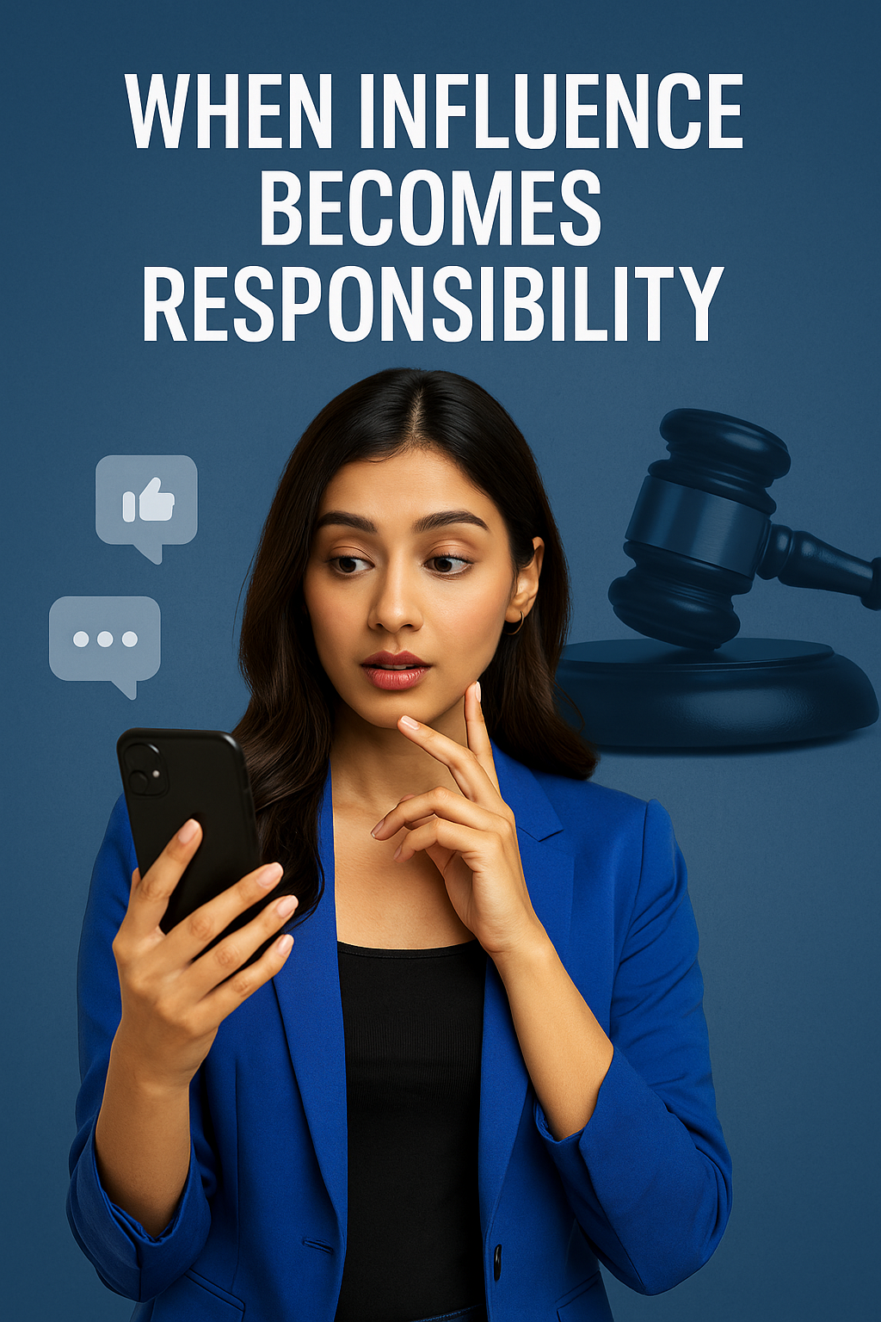
⚖️ Influencers Must Act Responsibly: Supreme Court’s Guidelines on Online Accountability 📱
The Supreme Court of India has recently emphasized that social media influencers with large followings must act responsibly, as their content significantly affects public opinion and social behavior.
This observation is a landmark step toward defining digital accountability in India — especially in an era where misinformation, hate speech, and viral content can reach millions in seconds.
🧾 Background: The Case Before the Supreme Court
The remarks came during a Public Interest Litigation (PIL) filed in 2024 seeking tighter control and regulation of online influencers who spread hate or misinformation.
The case — Ajay Gautam v. Union of India (2024) — was heard by a Bench headed by Justice Sanjay Kishan Kaul.
The petitioner argued that several influencers misuse their digital platforms to publish misleading or inflammatory content, harming public trust and social harmony.
⚖️ The Supreme Court’s Observation
“Influencers today enjoy significant reach and trust. Their words can influence millions. They must act responsibly and within the limits of the law.”
— Supreme Court Bench, 2024
The Court reminded that freedom of speech under Article 19(1)(a) is not absolute.
Influencers, just like traditional media, must ensure their content does not violate existing laws or threaten public order.
- 🚫 Hate speech or communal incitement is not protected speech.
- ⚖️ Misinformation or defamation can attract legal penalties.
- 📵 Influencers must remain accountable for their digital conduct.
📜 Legal Framework: Existing Laws That Apply
Although India does not yet have a specific Influencer Law, several provisions under existing statutes apply to online content creators.
1️⃣ Information Technology Act, 2000
- Section 66D: Punishes online impersonation and fraud.
- Section 67: Penalizes publication or transmission of obscene material in electronic form.
- Section 69A: Allows blocking of content that threatens public order, decency, or national security.
2️⃣ Indian Penal Code (IPC)
- Section 153A & 295A: Prohibits hate speech and acts promoting enmity.
- Section 499 & 500: Covers defamation, including statements made online.
3️⃣ Advertising Standards Council of India (ASCI) Guidelines, 2021
- Influencers must clearly disclose paid promotions using #Ad, #Sponsored, or similar tags.
- False or misleading endorsements may lead to warnings, takedowns, or penalties.
- All advertisements must comply with ASCI’s ethical code of conduct.
🧠 Supreme Court’s Key Takeaways
- 🧩 Influence demands responsibility: The larger your audience, the greater your duty to verify facts.
- ⚖️ Free speech is not absolute: Article 19(2) permits reasonable restrictions for decency, morality, and public order.
- 🚫 Misinformation and hate speech are punishable: Influencers may face criminal or civil liability.
📅 What’s Next? Possible Future Regulations
The Supreme Court directed the Central Government to explore new rules for influencer accountability.
It recommended that the Ministry of Electronics & IT (MeitY) and ASCI work together to draft a uniform policy that balances creativity with responsibility.
New guidelines may include:
- 🗂️ Registration or verification for major influencers
- 📜 Disclosure requirements for paid or political content
- ⚙️ Platform responsibility for hosting harmful material
💬 Why This Ruling Matters
The Court’s message is clear: freedom of speech must coexist with responsibility.
In a digital society, where words travel faster than facts, ethical conduct is vital.
“Influence is power — and with power comes responsibility.”
— Supreme Court of India, 2024
For influencers: verify facts, avoid hate, disclose sponsorships.
For audiences: question credibility, demand transparency, and value truth over trends.
📘 Free Study Material for Law Students!
Download our FREE study material prepared by Delhi Law Academy’s expert faculty.
💬 Frequently Asked Questions on Supreme Court Guidelines for Influencers
The Court stressed that freedom of speech under Article 19(1)(a) is not absolute — and that influencers are accountable for spreading hate, misinformation, or defamatory content.
These regulate hate speech, fake news, obscenity, defamation, and disclosure of paid promotions.
They require influencers to:
– Clearly disclose paid partnerships using tags like #Ad or #Sponsored
– Avoid misleading, exaggerated, or false claims
– Maintain honesty and transparency in endorsements
Violations can lead to warnings, takedowns, or legal action.
– Section 499/500 IPC for defamation
– Section 66D or 67 IT Act for online fraud or obscene content
– Section 153A IPC for promoting enmity or hate speech
Penalties may include fines, content removal, or imprisonment depending on severity.
However, the Supreme Court (Ajay Gautam v. Union of India, 2024) has asked the government to frame official influencer guidelines in collaboration with ASCI and MeitY to ensure accountability.
– Verify facts before posting content
– Avoid hate speech, defamation, or misleading promotions
– Disclose all paid or sponsored collaborations
– Follow IT, IPC, and ASCI norms
The Supreme Court emphasized that influence comes with responsibility — digital reach should not be used irresponsibly.
Contact us
📍 Delhi Law Academy – Jaipur Branch
6C, Tower 2, Coaching Hub, Pratap Nagar, Jaipur – 302033
📞 Phone:
+91 9911916552
+91 8447285606
✉️ Email:
contactus@delhilawacademy.com

